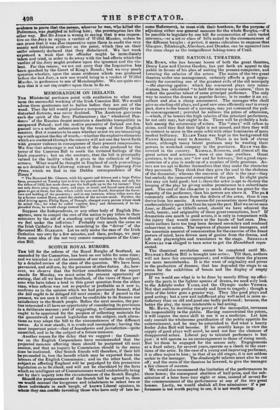MEMORANDUM ON IRELAND.
THE Ministerial partisans point with exultation to what they term the successful working of the Irish Coercion Bill. We would advise these gentlemen not to halloo before they are out of the wood. That the bill would produce a temporary tranquillity in the disturbed districts, was never doubted. The Austrian garrisons eurb the spirit of the fiery Piedmontese ; the" whiskered Pan- dours“ of the Russian despot maintain a deathlike tranquillity in oenquered Poland; awl the restive peasantry of' Ireland are dra- gooned- into a sullen submission by the troops of their English masters. But it remains to be seen whether or not we are treasuring up wrath against the day of wrath,—w hether the explosive elements which arc scattered through the country will not one day burst forth with greater violence in consequence of their present compression. We fear that advantage is not taken of the calm produced by the terror of the Coercion Bill to sooth the irritated feelings of the Irish peasantry' but on the contrary, that the bill is principally valued for the facility which it gives to the collection of tithe arrears. What would be thought in England of such proceedings as are detailed in the fallowing extract from the Tipperary Free Press, which we find its the Dublin correspondence of the Times 5'
" The Reverend Mr. Gleeson, with his agents and drivers and a large Police force, proceeded on Tuesday last to drive his parishioners in Boors, not only for
the tithes of 1832, but made them pay the half-gale up to the 1st instant ! They not only drove away sheep, cows, and pigs, as usual, and forced open doors and gates to get at them, hut also, where cattle were not found, distrained the furni- ture and bedding of the peasantry ; and in one instance, where tithes were due by a farmer named Mara, seized the clothes of the servant-maid. Further, the chief driving agent, Philip Ryan, of Nenagh, charged every person whose stock he seized 15s., for what he called caption fees ;' and threatened, if he im. pounded them, he would charge instead 26s."
Suppose the Independents, or any other body of English Dis- senters, were to compel the rest of the nation to pay tithes to their ministers by the aid of a standing army of Germans, how should we feel under the infl:ction? Probably very much the same as the Irish Catholics feel when crouching to the "driver" of the Reverend Mr. GLEESON. Let us only make the case of the Irish Catholics our own for a few minutes, and then, perhaps, we may form some idea of the not very remote consequences of the Coer- cion Bill.
















 Previous page
Previous page